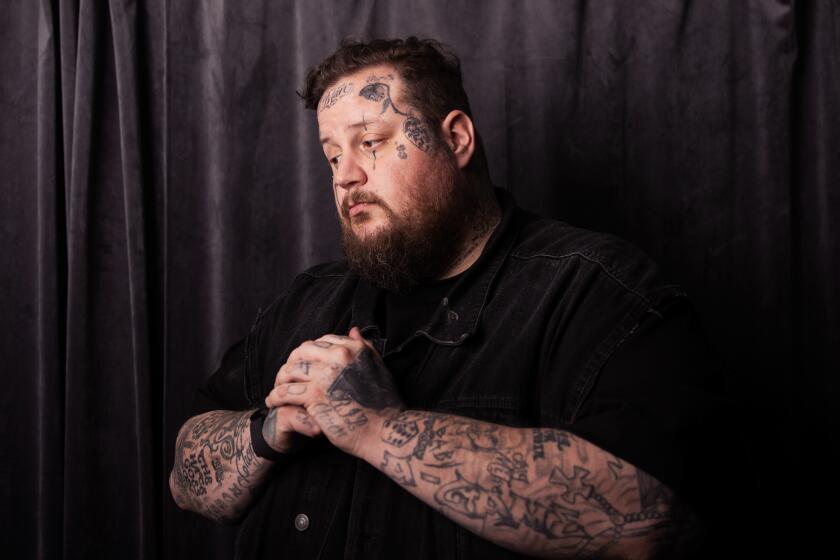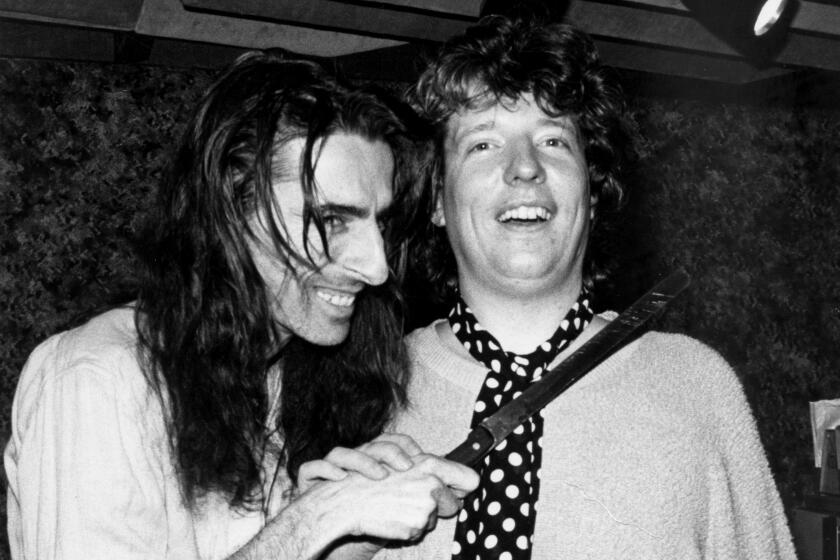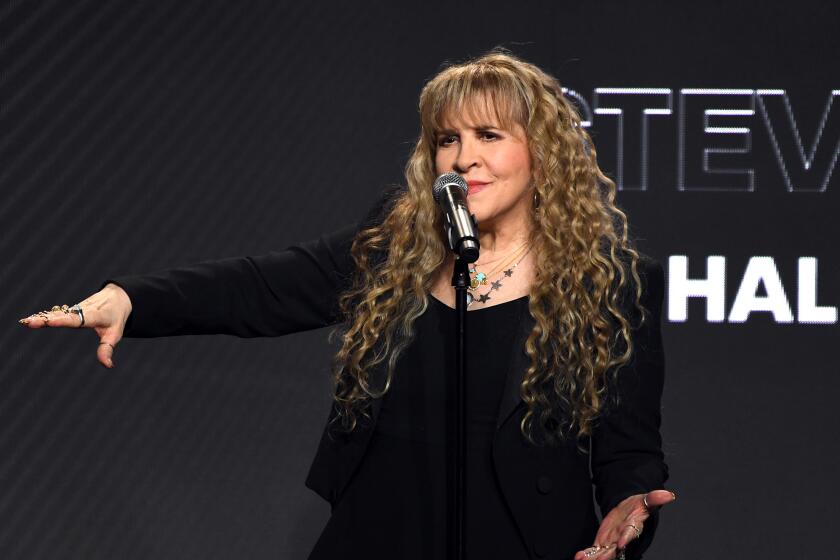Blondie’s Debbie Harry on her #MeToo past: ‘I was younger. I just felt that was Mother Nature’
- Share via
NEW YORK — Debbie Harry spent many years struggling to start a music career in New York City’s lawless 1970s. One night, she recounts in her insightful new memoir “Face It,” when she and boyfriend Chris Stein got back to their East Village building, they were accosted by a man with a knife who took them to their apartment, raped Harry and stole Stein’s guitars. “In the end,” she writes, “the stolen guitars hurt me more than the rape.”
The most distinctive quality in Harry’s book is her sangfroid. At each dramatic turn — and there are plenty — she remains unflappable. Whether it’s Phil Spector pulling a gun on her or David Bowie pulling out his penis, heroin addiction or her acting career, she moves on briskly. No fussing, no whining.
Harry, 74, was raised in Hawthorne, N.J., (which she calls “a small, uptight little town”) by adoptive middle-class parents who adored her but couldn’t fathom the dreamy girl’s fixations on Marilyn Monroe and nearby Manhattan. After two years of college, she found an apartment in the city (four rooms, $67 per month) and formed Blondie with guitarist and songwriter Stein. Harry was 31 when the group’s self-titled debut album came out in 1976.

From 1976 to 1981, Blondie was flawless, and its subversion of early-1960s girl-group innocence expanded hungrily to incorporate reggae, disco and rap. Alone among CBGB-born bands, it had hits: eight Top 40 singles, including four No. 1s: “Heart of Glass,” “Call Me,” “The Tide Is High” and “Rapture.” Harry was “a woman playing a man’s idea of a woman,” she writes, and the “Blondie character,” as she calls it, became a bedroom pinup, Farrah Fawcett for the weirdos.
For this interview at her publisher’s office in Lower Manhattan, Harry was joined by Stein, a dry, slender 69-year-old. (Their romance ended in 1987, but their musical partnership never stopped.) When I asked why Stein was part of the interview, he quipped, “They asked me to come. Whatever, I can keep quiet.”
Happily, he didn’t.
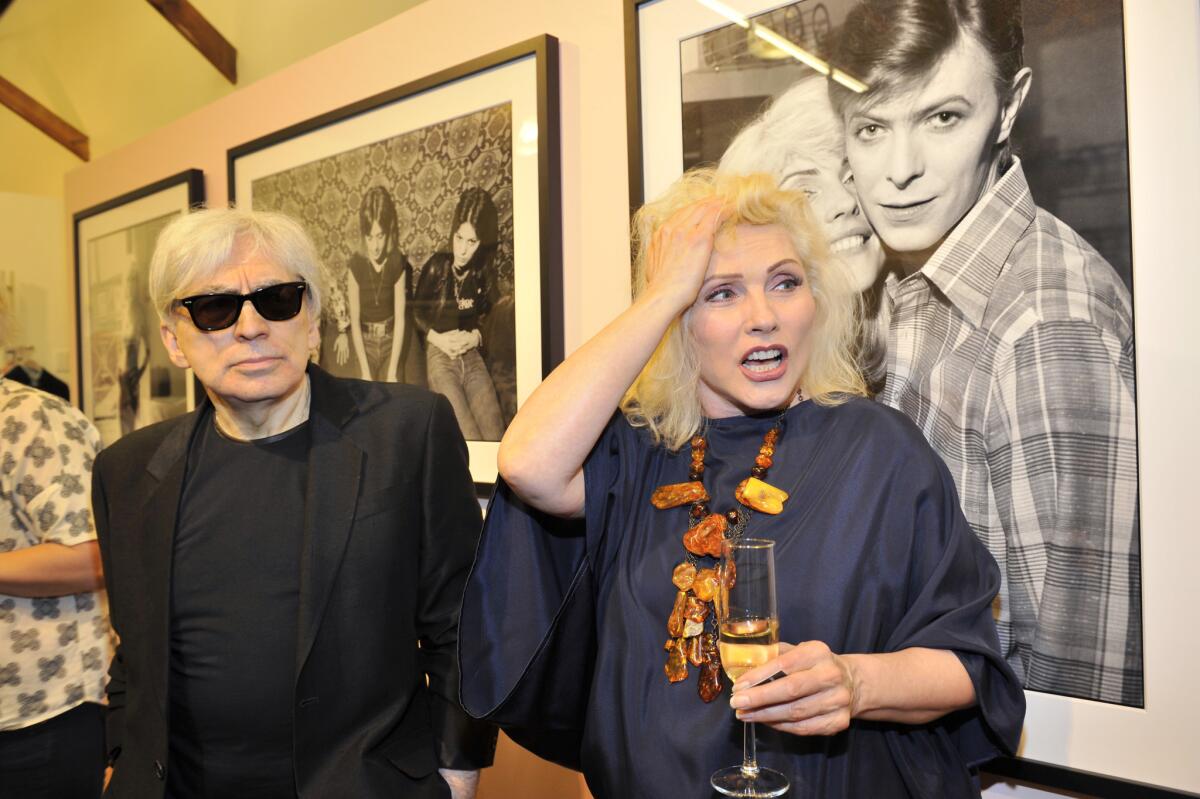
Debbie, when you were a kid, you were fixated on the idea of becoming an artist. What did that word mean to you back then?
Harry: Probably ridiculous ideas of freedom and glamour and unbridled thinking. What got to me in the 1950s was the Beat scene — poetry, jazz, whatever was in the movies. Plus, comedy was also a factor, oddly enough. There was always a comedian mocking the Beats. It said to my rebellious teenager self, “Well, this must be the right thing to do, because everybody is making fun of it.”
You write that in Blondie, you were “selling an illusion of myself.” Did you know that from the start, or was it something you figured out?
Harry: I had a couple of different starts in music. That first start in the ’60s [with Wind In the Willow, a folk group] and then I decided to try again in the ’70s. I was a little bit older than most people. That may have given me more perspective. I knew I was deluded and didn’t care: “Yes! More delusion!”
Where did that audacity come from?
Harry: I felt it was the time in my life when I should take a gamble. Otherwise, when I was 40, I’d be having a nervous breakdown. Those were the options. What would you choose?
When the first Blondie album came out, you were 31.
Stein: There was a moment when we were really on top, and Creem magazine announced that Debbie was over 30.
Harry: It ruined my career! (Laughs)
Stein: With respect, all that [stuff] is so naive. That and [music writer] Lester Bangs carrying on [in his 1980 book “Blondie”] about Debbie’s overt sexuality. I just wish he had lived long enough to see Britney Spears.
So did it feel, at the time, that this was your last chance to become an artist?
Harry: No. I was very optimistic. Chris and I both shared a blind optimism, a false sense of confidence. And we were smart enough to see that our popularity was building. We were able to survive in great part because of Chris’ mother [Estelle].
Stein: My mother was a Bohemian type, a really great painter, all that stuff.
Harry: Stel never questioned what we were doing or said, “You’re wasting your time.” She was very smart.
Apart from Chris’ mom, did you have other people who looked out for you and took care of you?
Stein: Many people were supportive, but nobody gave us donations.
Harry: Nobody had money then.
Stein: We played on New Year’s Eve [1976] in Central Park — right in Bethesda Fountain. The stage was on the fountain. The Parks Department paid us $500, which was the most we’d ever made doing anything.
Harry: Also, we were extras in a movie. God, that was excruciating.
Stein: Around ’73 or ’74, we wound up in a terrible movie called “Deadly Hero.” It’s about this lady, a cellist, who’s conducting a show which is kind of like “Hair,” and has a rock band in it. We were in the band. James Earl Jones plays a sort of good-natured home invader. Don Murray, the cop, kills him unnecessarily. The cellist is the only one who knows he’s a killer. They have a big showdown and she stabs him with the point of her cello. We got $300 each.
Harry: And egg salad sandwiches.

Debbie, when you write, “I could never put myself into the position of whining about being a woman. I just got on with it,” was that partly in response to the #MeToo movement?
Harry: My manager, Allen Kovac, kept saying to me, “You have to bring this up. You have to put it in the book.” I always felt I had a strong masculine bit in my brain, that I wasn’t going to be a frail petite fleur type. Plus I was partners with Chris, who was always completely supportive.
You describe yourself in the book as “a woman with a man’s brain.”
Harry: Yes. I don’t know if that’s entirely true. I do have a stubborn quality, and I’m athletic — I have physical strength, and I rely on that. I don’t think anybody who’s frail could be in a band. At least not for long.
Is it fair to say you had #MeToo experiences, but they didn’t bother you much?
Harry: Those #MeToo experiences were when I was younger, and I expected that, felt it was part and parcel of being out in the world. I suppose it was frustrating, but nothing bad happened to me. I just felt that was natural. This is Mother Nature talking.
Stein: She would tell me, “so-and-so hit on me” — some famous guy — and she’d be amused by it. In our day, women were conditioned to accept a lot of bad behavior from men and think it’s normal.
Debbie writes that at the peak of success, her ego got out of control. Do you think that’s true, Chris?
Stein: Nah, I never got a sense of that. There’s a lot of [bad] judgment doing drugs, but I never got the sense she was egomaniacal. I’m sure some of the other guys in the band might’ve thought that. There was a lot of jealousy in the band.
Jealousy about money or attention?
Harry: Our financial fortunes were all divided up pretty equally. It was about attention.
Did band antagonism ever turn physical?
Stein: We had a big brawl one time, at [the London club] Dingwall’s, around 1977. It was hot and sweaty, and I was ill. And, I don’t know, [keyboardist] Jimmy [Destri] wouldn’t turn down [his amp], or [drummer] Clem [Burke] kept starting the songs and wouldn’t wait for everybody else. Madness ensued. There was a big pile-on, the whole thing rolled out into the alley and then we were separated.
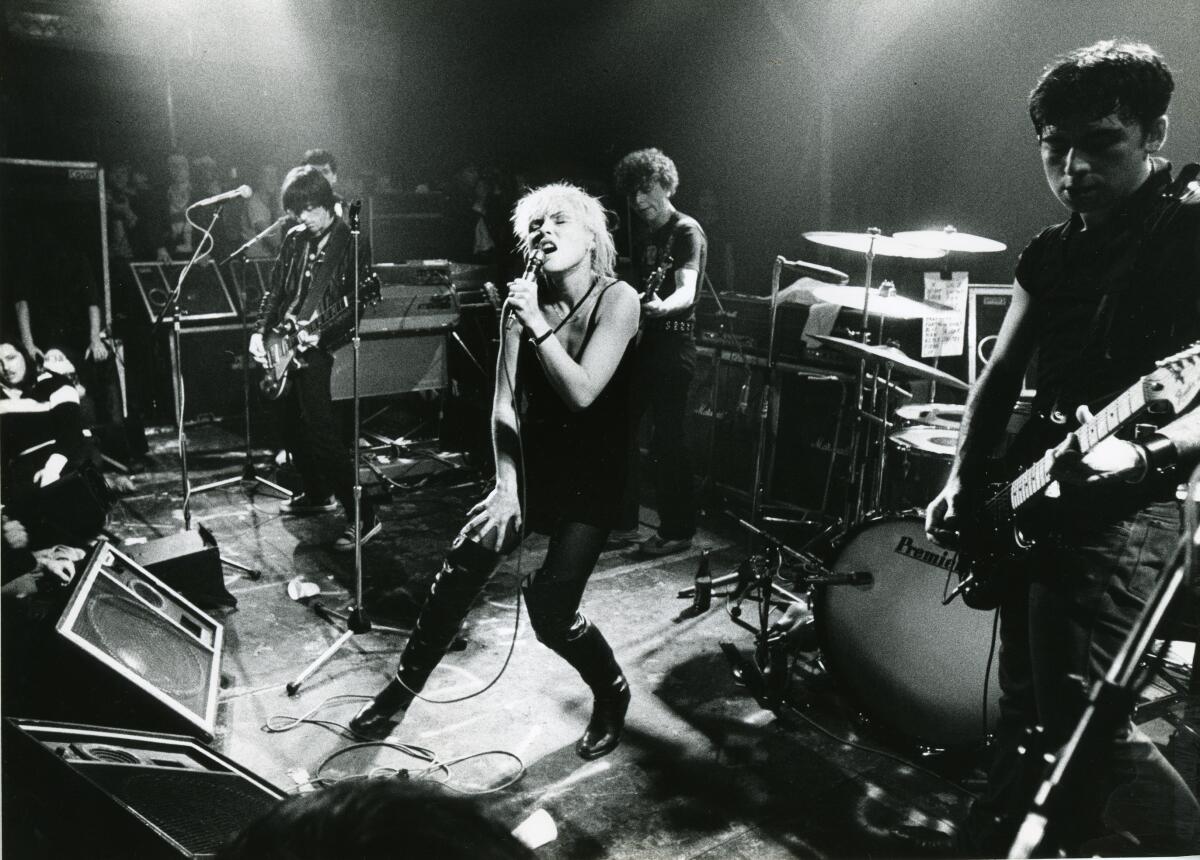
Debbie, you write about your heroin addiction. You write about the fear of abandonment that comes from being adopted. You write about bringing heroin to Chris when he was sick in the hospital in the early ’80s with the autoimmune disease pemphigus. But you didn’t write about why you broke up with Chris. Why leave that out?
Harry: Our world sort of caved in. I felt like I was having a nervous breakdown. There was just so much stress and struggle. I felt like we weren’t very good for each other. The other thing (laughs) — I don’t know if you should write this, because I don’t know if I’ve ever said this to Chris — I felt like Sartre and Simone de Beauvoir, in a way. They had a strong, lifetime relationship. They lived separately, but they were together. (Pauses) I don’t know if I did the right thing. But who’s to say? Chris is happy. He’s got two kids [ages 16 and 14] and a lovely wife. Our relationship hasn’t been destroyed. We’ve made many more Blondie albums, and he’s worked on all my solo albums. Our productivity and our relationship have grown.
Debbie, you take a few shots at people, from a former manager to Madonna. Do you expect your memoir will make any of these people angry?
Harry: I didn’t really nail anybody.
Stein: Yeah, you could have.
Who could you have nailed?
Harry: (Laughs)
Stein: You don’t have enough time.
More to Read
The biggest entertainment stories
Get our big stories about Hollywood, film, television, music, arts, culture and more right in your inbox as soon as they publish.
You may occasionally receive promotional content from the Los Angeles Times.



